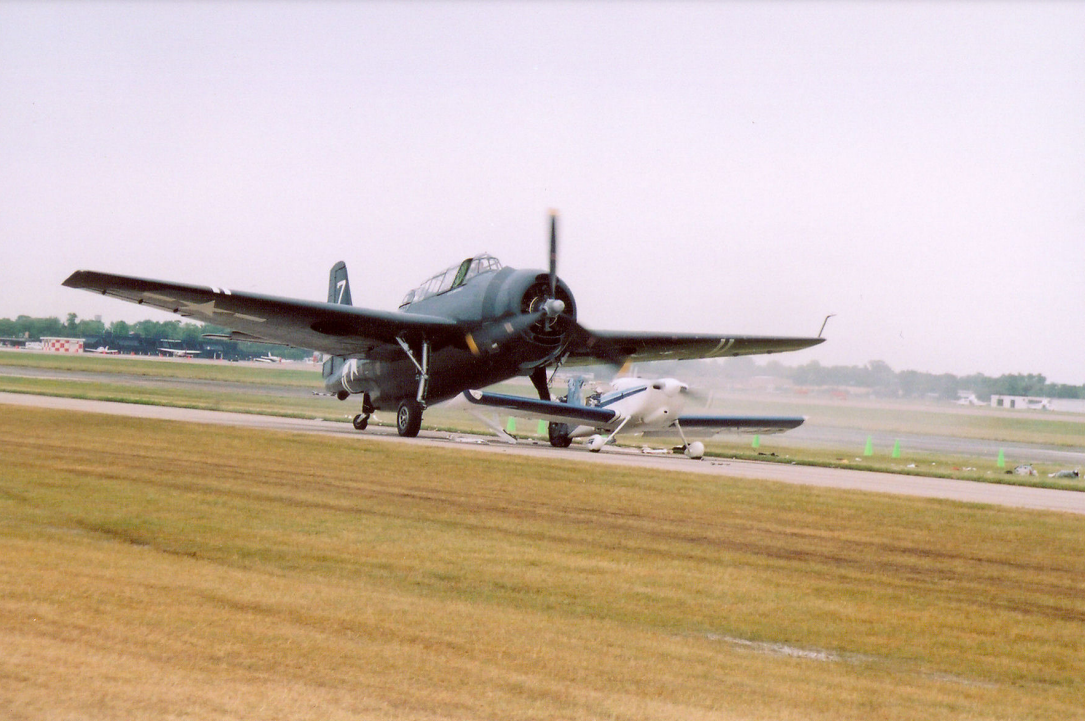
ASN Wikibase Occurrence # 44059
This information is added by users of ASN. Neither ASN nor the Flight Safety Foundation are responsible for the completeness or correctness of this information.
If you feel this information is incomplete or incorrect, you can submit corrected information.
| Date: | Sunday 30 July 2006 |
| Time: | 12:07 |
| Type: |  Grumman TBM-3 Avenger |
| Owner/operator: | Tri-State Warbird Museum |
| Registration: | N420GP |
| MSN: | 53420 |
| Year of manufacture: | 1944 |
| Total airframe hrs: | 4843 hours |
| Engine model: | Curtiss Wright R-2600-20 |
| Fatalities: | Fatalities: 1 / Occupants: 2 |
| Aircraft damage: | Minor |
| Category: | Accident |
| Location: | Oshkosh-Wittman Field (OSH/KOSH), Oshkosh, WI -
 United States of America United States of America
|
| Phase: | Taxi |
| Nature: | Private |
| Departure airport: | Oshkosh-Wittman Field, WI (OSH) |
| Clermont County Airport, OH (I69) | |
| Investigating agency: | NTSB |
| Confidence Rating: |
An amateur-built RV-6 sustained substantial damage when a Grumman TBM-3, Avenger, taxied into the empennage and fuselage of the RV-6. Both aircraft were taxiing for takeoff on Papa taxiway (35 feet wide, ashphalt), which paralleled runway 18 at the Wittman Regional Airport (OSH), Oshkosh, Wisconsin. The accident occurred during the EAA AirVenture 2006 air show. The RV-6 pilot reported that he taxied forward on the P-1 taxiway and was directed by the volunteer flag person to taxi south on Papa taxiway. He reported that he was taxiing behind a green and white, high wing airplane that had TUNDRA painted on the top of the wing. The Avenger pilot reported he taxied the Avenger south from the warbird parking area toward the P-1 taxiway. He observed the flag person clear him to begin taxiing on Papa taxiway. The Avenger pilot reported that the airplane in front of him was a green and white, high wing airplane with TUNDRA written on top of the wing. He reported that he taxied at a very slow speed with the propeller speed set about 800 RPM. He reported that the Avenger had no mechanical defects and that the brakes were good. The Avenger pilot reported that he observed the Tundra pilot taxi off the right side of the taxiway for some unknown reason. The Avenger pilot reported that he spotted the airplane that was in front of the Tundra airplane, and he stated that he had "100 yards of free pavement" in front of the Avenger. The Avenger pilot reported that when he heard the impact and saw debris flying, he shut down the engine. He reported that he never saw the airplane that he hit while he was taxiing. Witnesses reported that the Avenger pilot did not make any "S-turns" while taxiing. The distance traveled by the Avenger from the intersection of the P1 taxiway and Papa taxiway to the impact point was about 1,180 feet. The relative speed between the Avenger and RV-6 at impact was calculated to be approximately 6.9 knots. A visibility study of the Avenger and RV-6 was conducted. The visibility study indicated that an "Area of No Visibility" extended from the Avenger's pilot position out to approximately 170 feet. No part of the RV-6 was visible to the Avenger pilot until it was positioned approximately 170 feet from the pilot in the Avenger. CAD drawings used in the visibility study demonstrated the following results if an "S-Turn" of 10 degrees was performed on the taxiway: With a turn of 10 degrees, the wing of the RV-6 was visible all the way to the area of impact, and the airplane was never wholly within the Area of No Visibility. A second visibility study was conducted and it confirmed that portions of the RV-6 could be seen from the cockpit of the Avenger all the way to the area of impact when the Avenger was angled 10-degrees from the taxiway centerline. The Airplane Flying Handbook states the following about taxiing a tailwheel-equipped airplane: "Since a tailwheel-type airplane rests on the tailwheel as well as the main landing wheels, it assumes a nose-high attitude when on the ground. In most cases this places the engine cowling high enough to restrict the pilot's vision of the area directly ahead of the airplane. Consequently, objects directly ahead of the airplane are difficult, if not impossible, to see. To observe and avoid colliding with any objects or hazardous surface conditions, the pilot should alternately turn the nose from one side to the other-that is zigzag, or make a series of short S-turns while taxiing forward. This should be done slowly, smoothly, positively, and cautiously."
Probable Cause: The Avenger pilot's visual lookout was inadequate and he failed to maintain clearance from the RV-6. Contributing factors were the Avenger's restricted visibility and the RV-6.
Accident investigation:
 |
|
Sources:
NTSB: https://www.ntsb.gov/_layouts/ntsb.aviation/brief.aspx?ev_id=20060804X01093&key=1
Location
Images:

Photo: NTSB
Revision history:
| Date/time | Contributor | Updates |
|---|---|---|
| 28-Oct-2008 00:45 | ASN archive | Added |
| 19-Jul-2010 03:42 | angels one five | Updated [Total fatalities, Narrative] |
| 19-Jul-2010 03:45 | angels one five | Updated [Total occupants] |
| 21-Dec-2016 19:24 | ASN Update Bot | Updated [Time, Damage, Category, Investigating agency] |
| 05-Dec-2017 09:18 | ASN Update Bot | Updated [Operator, Total fatalities, Other fatalities, Source, Narrative] |
| 15-May-2022 20:46 | Captain Adam | Updated [Operator, Other fatalities, Location, Departure airport, Destination airport, Narrative, Accident report, Photo] |
Corrections or additions? ... Edit this accident description
The Aviation Safety Network is an exclusive service provided by:


 ©2024 Flight Safety Foundation
©2024 Flight Safety Foundation